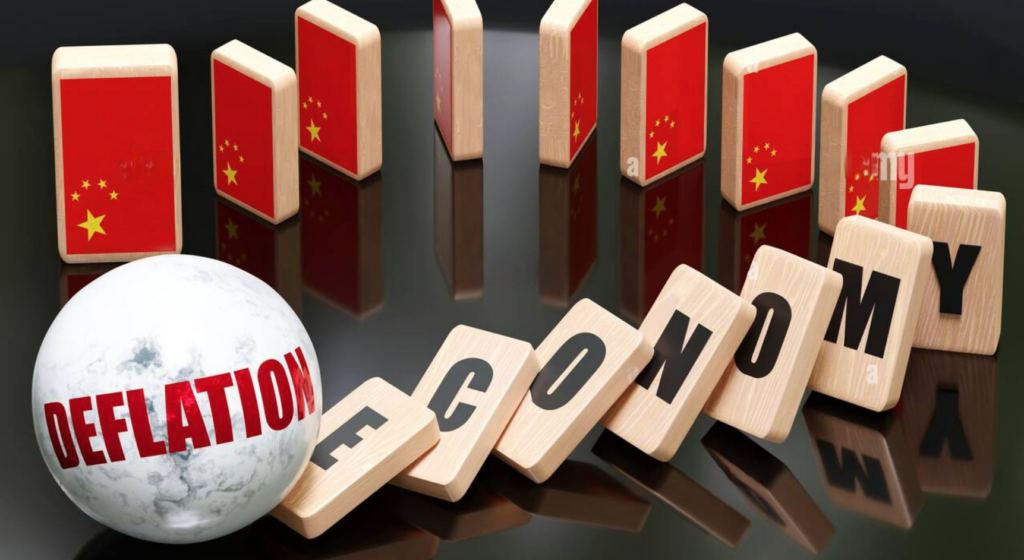Digital Zeitgeist – The Perils of China’s Deflation – A Tumbling Domino with Global Repercussions
While several countries are wrestling with the spectre of inflation, China, the world’s second-largest economy, is standing on the precipice of an equally dangerous financial abyss: deflation. A 0.3% fall in prices this past July, year-on-year, might initially seem miniscule, but its potential ramifications are anything but.
For households, reduced prices may provide temporary solace. However, for governments and central banks, deflation can be a more alarming signal than inflation. Without intervention, plummeting prices can reduce corporate profits, dent investor confidence, curtail business investments, and consequently, drive up unemployment rates.
The question then is, why is China at risk of facing such a predicament, especially when most of the world is grappling with the opposite issue?
The Deflationary Web
The origins of this deflationary trend are multifaceted, but a significant factor is the post-pandemic slump in consumer activity and confidence. During the pandemic’s zenith, many Chinese businesses were thriving due to the surging global demand for medical equipment, home working tools, and various e-commerce products. However, once economies started to reopen, this external demand shrivelled without a corresponding surge in internal consumption.
The after-effects of severe lockdowns, leading to business closures and a depletion of family savings, have scarred the Chinese consumer sentiment. With the future seeming uncertain, many are choosing frugality over expenditure.
Compounding the problem, China’s economy is still grappling with the aftereffects of previous ‘over stimulus’. Massive subsidies post the 2008 financial crisis and a pervasive culture of borrowing for investments have resulted in overproduction and a massive accumulation of debt.
Disturbingly, the current crisis in the property sector, combined with an alarming 20% unemployment rate among the youth, sketches a challenging picture for the Chinese economy.
Rippling Impacts
The interconnected nature of the global economic framework means that a deflationary spiral in China can have cascading effects worldwide. As Chinese products become cheaper due to deflation, they threaten to undercut a multitude of international businesses. Moreover, reduced Chinese demand for foreign imports such as food, energy, and raw materials could destabilise the financial stability of nations, with the UK’s balance sheets being a notable example.
China’s governance understands the gravity of the situation. Historically, the nation’s economic prosperity has been a linchpin for the one-party system’s legitimacy. With the population accustomed to upward mobility and economic growth, any deviation poses a challenge to the established order. Although some small-scale stimulus measures have been introduced, they predominantly focus on vital strategic sectors. A more expansive stimulus might be untenable and potentially counterproductive, given its probable contribution to the present quagmire.
On a brighter note, it’s crucial to realise that the Chinese economy, though facing headwinds, continues to grow, albeit at a slower pace. Monthly data also offers some solace, with prices seeing a 0.2% growth and Core CPI rising by 0.8%.
A Devil’s Advocate Perspective
Deflation in China, while concerning, might also present opportunities. Cheaper goods can potentially increase consumers’ purchasing power, both domestically and globally. This could be a boon for economies struggling with inflation, as affordable imports might ease some inflationary pressures.
Furthermore, China’s demonstrated ability to adapt and navigate past economic crises is worth noting. The nation’s proclivity for swift policy implementation might just be the antidote needed to stave off a prolonged deflationary period.
In conclusion, while the looming shadow of deflation over China presents genuine concerns, it’s essential to balance this with the potential opportunities it might unveil and the inherent resilience demonstrated by the Chinese economy. Only time will ascertain the eventual trajectory, but for now, the world watches with bated breath.
Disclaimer: The views and opinions expressed in this article are those of the author and do not necessarily reflect the official policy or position of GPM-Invest or any other organisations mentioned. The information provided is based on contemporary sourced digital content and does not constitute financial or investment advice. Readers are encouraged to conduct further research and analysis before making any investment decisions.

